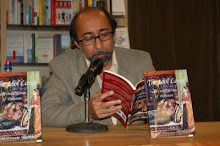Old Reviews:
Act of liberation or trap
Immigrant dreams
Act of liberation or trap
Immigrant dreams
Short Girls gives a rare insight into the making of a
modern America
By Moazzam Shiekh
Finally there's a novel about short people, a narrative
that situates the idea of shortness at the centre of the Luong sisters'
lives. The novel contains chapters named after Van and Linny. After we learn
in the opening chapter that Van Luong's husband Miles (a
fourth-generation-Chinese-American) has moved out, very little happens in the
following pages. Linny has been having an affair with a white man, Gary, who
is married to a white woman, with two little children. The Luong sisters have
grown diametrically opposite to each other's personality. That sets the tone
for an émigré novel.
The novelist offers two extremes of the immigrant
experience. If Van is the geek, Linny is the slut. If Van is shy,
self-conscious, unconfident, insecure, Linny is aggressive, daring and
flirtatious. If Van is political (learning Arabic so she can help deportees,
is aware of the anti-Middle Eastern wave), Linny is only sexually alive,
creative (helping her employer with ideas for new dishes). Van lives in
suburbs, understands the system, its ruthless inequality. Her interest in
becoming a lawyer began in college "when she first learned about Vincent
Chin, the Chinese American who had been beaten to death in 1982, by an
autoworker and his son who ended up serving no jail time." Linny doesn't
buy into the system, can't stand suburbs. But as Toni Morrison says:
"Everything is political."

Vietnamese immigrants carry a unique cross in the US. Most
arrived as refugees, a status that resulted straight from their colonial
tragedy. They first defeated the French, later the Americans as they tried to
keep Vietnam shackled. The French and later the US tried to crush the will of
a people. Just as the West created the Mujahideen out of Afghan refugees, the
Western powers created a fifth column in Vietnam. Though the two narratives
turned out different, the price the two populations paid was similar.
So here is the fix: you are a refugee, but refuge is in
the country that waged a decade long war on your people, killing over 3
million. The world acknowledges the US as the aggressor; modern scholarship
holds America guilty of genocide, not to mention the unimaginable destruction
of land, culture and families. That's the context in which the Vietnamese
entered the US, first as refugees, later immigrants and finally as citizens.
This novel shows a daring break from silence as it fleshes out a different
narrative at the risk of being called ungrateful. The novel doesn't simply
highlight difficulties faced by immigrants but is critical of the US foreign
policy. When Miles questions his wife regarding her insecurities and
nervousness, her answer that their first home -- the refugee camp -- faced a
prison complex, is not only painful but deconstructs the American Myth.
| Author Bich Minh Nugyen |
The un-political Linny, too, feels the burden of the
affair. As Nguyen explores the relationship, Gary becomes a metaphor for
America. The well-off Gary, married to a tall, good-looking Prentice, only
seeks a sexual relationship, rendezvousing at motels and odd places. Linny
has never dated a Vietnamese man, grows uncomfortable of the affair,
assessing the psychological implications. While she feels demeaned, her lone
consolation is that she has never allowed Gary into her apartment. Her
bedroom is uncontaminated. But, then, he forces his way into her safe refuge,
and sleeps with her. The politics built into this scene reminded this
reviewer of an Urdu classic, Anandi, suggesting you can banish prostitution
from the city, but you can't kill the city inside prostitution. The bedroom
scene is multi-layered, not just hinting at a possible rape but at how
difficult it is to fight off the influence of American imperialism. You may
be attracted to its hugeness, its whiteness or repulsed by its aggression,
its greed; it is there in your face. At least, as an immigrant.
As the non-linear narrative unfolds, the reader learns of
the sister's relationship with their father, Mr. Luong, an inventor, deeply
aware of his short stature. Worried about the shortness of his daughters and
of others, Mr. Luong invents the Luong Arm that can reach longer distance,
the Luong Eye that can see above and beyond a taller person's head, and the
Luong Wall with adjustable height. While his girls have manoeuvred their way
out of his patriarchal grip, they feel affection for him, who, despite having
risked his life moving to America, has never applied for the US citizenship,
up until now.
The narrative builds itself towards the Citizenship
ceremony. Miles was expected to accompany Van to the party afterwards. But
the split is permanent. Miles is gone, gone for someone who's the opposite of
Van, in terms of personality attributes, someone who, like Miles, is Chinese
American and carries the confidence of the third or fourth-generation
American, is tall, elegant, and graceful. In fact, her name is Grace. When
alive, their mother had said, "You can be the famous Trung
sisters," alluding to the two sisters who rebelled against the Chinese
rule. Van's painful but clean break-up with Miles remaps that history.
Soon the sisters re-connect, emotionally, are helping each
other with moving on in life. The father does not go ballistic on hearing of
the divorce. Van moves into a smaller place, resolving to fight for justice
as a lawyer. Linny meets Tom, a Vietnamese family friend. The attraction is
mutual. The frozen attitude to "Vietnam, a scary unknown" begins to
melt.
While Short Girls deals with important issues, there is no
lyricism in the prose. Despite the non-linear narrative Short Girls offers
little artistic tension. Though the author injects her knowledge of library,
legal and pop culture, they fail to evoke much. The lack of complexity in the
prose lowers the impact. But the novel has a rare insight into the making of
a modern America, good and bad. It's important that the novel never stoops to
preaching or sentimentality. Nor does it exoticises Vietnam. And that's a
rare feat.

1 comment:
Loved reading this thhank you
Post a Comment